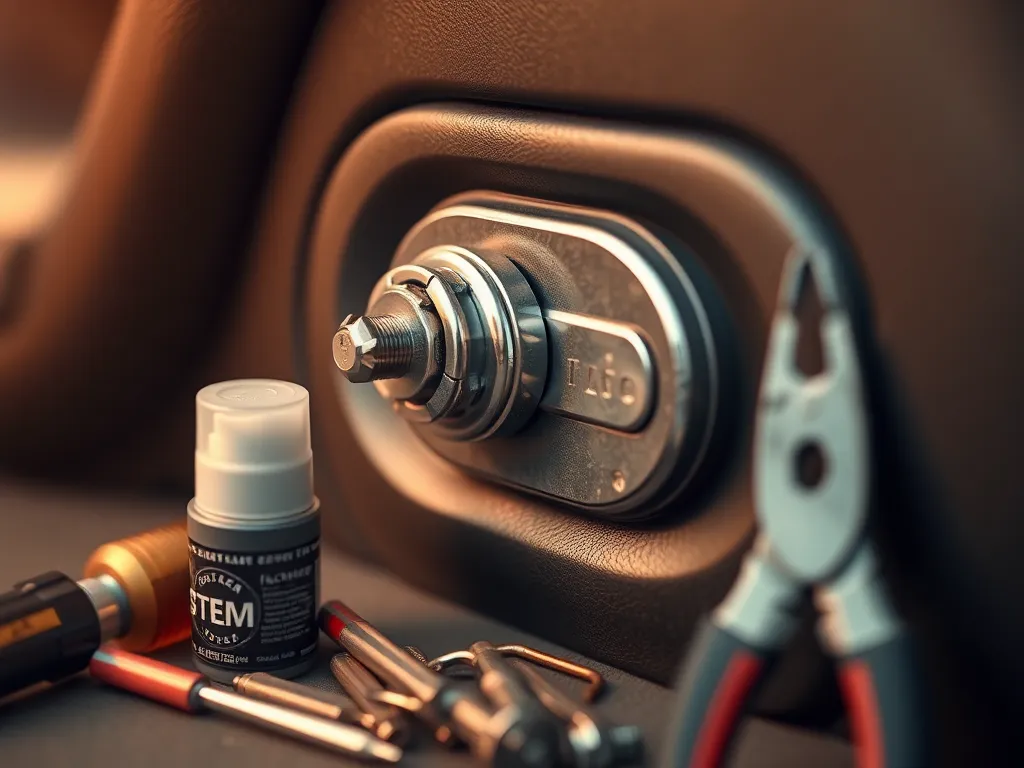Common Car Door Lock Problems and Solutions Explained

Understanding Car Door Lock Problems
Car door lock problems can be a major inconvenience for vehicle owners. These issues can range from stuck locks to malfunctioning electronic systems, leading to frustration and potential safety concerns. Whether it's an old car experiencing mechanical failures or a new model with advanced technology, understanding the various types of car door lock problems can help you address them effectively.
One common type of car door lock problem is related to stuck locks. This can occur due to various factors, such as dirt buildup, rust, or frozen components during winter. Identifying the root cause is essential for implementing the correct fixes. Another frequent issue is electronic lock failure, where the locking mechanism may fail due to a dead battery, faulty wiring, or a malfunctioning key fob. Recognizing symptoms like unresponsive locks can help in troubleshooting the problem.
Learn the essentials of fixing a car door lock by checking this guide.
Keyless entry systems are also prone to difficulties, like broken remote controls or interference from other electronic devices. Troubleshooting these issues often involves checking the battery and ensuring the signal is not obstructed. Mechanical lock problems can also arise, particularly in older vehicles, leading to wear and tear that affects the locking mechanism. Identifying these problems early can prevent complete lock failure.
If you're interested in advanced car door locking techniques, explore more here.
Seasonal issues, like frozen door locks during winter, require special care to prevent damaging the lock mechanism. It’s crucial to understand how different environments affect your car door locks and take preventative measures. Awareness of these common car door lock problems can save you time and stress while ensuring the security and functionality of your vehicle.
In conclusion, car door lock problems can arise from various sources, including mechanical wear, electronic failures, environmental factors, and design issues. By understanding the types of problems and their causes, you can take proactive steps to maintain your locks, troubleshoot issues when they arise, and ensure your car remains secure and accessible.
Types of Car Door Lock Problems
Stuck car door locks can be caused by dirt and grime buildup, rusting mechanisms, or frozen components in colder weather. Regular cleaning and proper lubrication can often resolve these issues, but if the lock remains stuck, further disassembly or key replacement may be necessary. It's important to address this as a stuck lock can leave you unable to access your vehicle, creating inconvenience and frustration.
Electronic lock failures manifest through symptoms like unresponsive locks, failure to recognize the key fob, or the inability to unlock the doors remotely. These problems often stem from dead batteries in the key fob, wiring issues, or damaged locking motors. Solution typically involves replacing batteries or checking the wiring for any disconnections or short circuits.
Discover the latest in high-security car door locks at our site.
Keyless entry issues can occur due to remote malfunction, low battery in the remote, or interference from other electronic signals. When troubleshooting keyless entry problems, start by replacing the remote battery and verifying that the car's receiver is functioning correctly. If issues persist, the key fob may need reprogramming.
Mechanical lock problems often arise from internal wear and tear. Symptoms may include difficulty turning the key or a lock that does not secure properly. To diagnose mechanical issues, inspect the lock for physical damage and debris, and consider lubricating the mechanism. If problems persist, professional assistance may be necessary to avoid further damage.
Frozen car door locks can be a significant issue during winter. Moisture can freeze inside the lock, making it inoperable. To prevent this, use silicone-based lubricants, park in a garage, or cover locks with protective covers. If locks freeze, applying heat gently or using a lock de-icer can help restore functionality without damaging the lock mechanism.
Preventive Measures for Car Door Locks
Routine maintenance is crucial to ensure your car door locks remain functional. Regularly check locks for dirt and debris, clean them with suitable cleaning products, and apply lubricant as needed to prevent them from seizing up. Making maintenance a regular habit can help you catch issues early before they escalate.
Using proper lubrication techniques is essential for smooth locking mechanisms. Choose silicone or graphite-based lubricants and apply them sparingly to the lock cylinder and its components. Avoid using WD-40 or oil-based products, as they can attract dust and grime, leading to more significant issues in the future.
Weatherproofing your locks involves both physical and chemical protection. Consider using lock covers during heavy rain or snow seasons to prevent dirt accumulation and moisture intrusion. Additionally, applying a weather-resistant spray can help shield internal components from harsh environmental conditions.
Regularly inspect your door locks for signs of wear and tear, such as loose key entry points, rust, or difficulty locking/unlocking. If you notice significant issues, replacing locks before they fail entirely can save you from unexpected situations where you may be unable to access your vehicle.
In emergencies, knowing how to open locked doors can be beneficial. Keep a spare key accessible in a secure place or use emergency lockout tools if necessary. Familiarizing yourself with your vehicle's specific lock type and potential workarounds can also prove invaluable in urgent situations.
DIY Repair for Car Door Lock Issues
For basic tools needed for lock repair, ensure you have screwdrivers (both flathead and Phillips), lubes, a small pick set, and a flashlight. A well-stocked toolkit will equip you to handle most minor lock issues without needing professional help.
If you're dealing with a stuck lock, start by inspecting the lock for dirt or debris. Apply a suitable lubricant, and try gently jiggling the key while turning it. If this doesn't work, try removing the door panel to access the lock mechanism directly and check for any visible obstructions or damage.
Accessing the lock mechanism usually involves removing the interior door panel. Use a screwdriver to carefully remove screws and clips, and gently pull the panel away to expose the lock's internals. This visibility allows you to check for issues like disconnected cables or accumulated grime impacting operation.
Replacing key fobs can often be performed easily by ordering a replacement online and following the vehicle manufacturer’s instructions for programming it. In many cases, the process involves insertion of the key in the ignition and following specific steps to sync the new fob to your vehicle's locking system.
During repairs, common mistakes to avoid include forcing keys in locks (which can cause deeper damage) and using the wrong lubricant type. Also, neglecting to reassemble all components correctly after repair can lead to further lock failures. Always double-check your work to ensure all components are secure.
Professional Help for Car Door Locks
Knowing when to call a locksmith is vital. If you experience persistent lock issues that don’t resolve with simple troubleshooting, or if you’ve lost keys entirely, reaching out to a professional can save stress and time. Also, if you've attempted DIY repairs and need expert assistance, a locksmith is your best option.
Understanding lock replacement costs can help you budget for necessary repairs. Prices vary based on lock type and whether any extra work is needed, like reprogramming electronic locks. Generally, it’s wise to get multiple quotes to ensure you're receiving a fair price.
Choosing the right automotive locksmith involves looking for reputable professionals with proven experience. Check for customer reviews, inquire about their credentials, and ensure they carry insurance. A reliable locksmith should also offer a warranty on parts and labor.
Professional lock service can provide a range of benefits, including expert diagnosis, effective repairs, and peace of mind. Experienced locksmiths can often resolve issues quickly and efficiently, reducing the risk of further damage to your vehicle's locking system.
To find a reputable locksmith, start by asking for recommendations from friends or family. Online searches for local locksmiths with customer ratings can also yield reliable results. Verify their credentials and certifications to ensure they are qualified to work on automotive locks.
Safety and Security of Car Door Locks
The importance of secure locks becomes evident through alarming statistics relating to vehicle theft. Studies suggest that a significant percentage of stolen cars were due to compromised locking systems. Ensuring your locks are in good working condition is essential for safeguarding your investment.
Upgrading to smart locks has become popular for enhancing security. Smart locks offer features like remote access, integration with smartphone apps, and alerts for unauthorized entry attempts, providing a higher level of safety compared to traditional locks.
Understanding lock vulnerabilities is crucial for preventing theft. Knowing weak points in your locking system, such as outdated mechanical locks, can guide you in upgrading or securing those areas. Proper installation and maintenance are equally important in enhancing security.
To avoid car theft related to lock issues, ensure that your locks are routinely checked and maintained. Additionally, consider investing in supplementary security measures, such as steering wheel locks or tracking systems, to deter thieves further.
Insurance implications for lock-related incidents can vary based on your provider’s policies. It’s essential to speak with your insurance company to understand coverage regarding theft or damage due to lock failures, ensuring you’re adequately protected in case of an incident.
